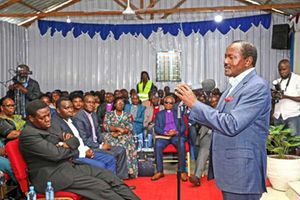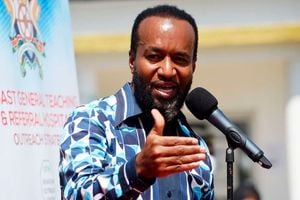Control campaign spending to avoid graft after elections

Voters queue to cast their votes at Muchatha Primary School polling centre during the Kiambaa Parliamentary by-election on July 15, 2021.
What you need to know:
- Political donations are mostly aimed at influencing a political trajectory or to gain favours from the political establishment.
- A number of large corporations and wealthy business people rely on political patronage and post-election graft.
Our elections have become highly competitive because of the power, prestige and benefits attached to elective positions. The winner-take-all election system, in which the winners exclude the rest from the government, creates a do-or-die political competition and increased the cost of running for office, impacting political and socioeconomic development.
Similarly, the increased willingness of private sector players to participate in partisan politics through funding of political parties and candidates has exposed the winners to manipulation and, sometimes, capture to serve sectarian interests instead of prioritising service delivery to the people.
The hope of regulating election campaign fundraising and spending was dashed by the High Court’s suspension of the implementation of the Election Campaign Financing Act 2013, which provided a framework for candidates and parties to receive controlled contributions, to form campaign finance committees and to account for funding.
The IEBC draft covered a provision for its enforcement, candidate selection, donation and spending limits, book-keeping and disclosure requirements. But the law requires that they be in place a year to the polls.
Cap campaign spending
In November, the National Assembly nullified the Campaign Financing Regulations gazetted by IEBC that August seeking to cap campaign spending for presidential candidates at Sh4.4 billion and give political parties up to Sh17.7 billion for campaigns. Single-source contribution to candidates or parties was limited to 20 per cent of the respective schedules. So, Parliament handed the politicians a blank cheque.
Unregulated cashflow for political parties and election campaigns threaten key democratic principles and values. When politicians and political parties focus more on financiers than public interests and needs, service delivery is compromised for political expediency. Lack of information on how much money parties raise and how they spend it only serves to harm the integrity and accountability of political processes and institutions.
Political donations, though packaged as apolitical or even motivated by a sense of public duty on the part of the benefactor, are mostly aimed at influencing a political trajectory or to gain favours from the political establishment. The reality of influence of Big Business in financing parties and candidates is that some of the biggest owners of capital are inextricably linked to high-level politics. A number of large corporations and wealthy business people rely on political patronage and post-election graft.
Kenya is also experiencing the rise of the ‘tenderpreneurs’ — people who use their proximity to power to secure government contracts for selfish gain. It is a thriving multi-million-dollar industry with its own rules and goes by names like ‘cartels’ and ‘cabals’. Until we regulate our election campaign fundraising and spending, Kenyans’ post-election interests will always be subservient to those of political merchants through corruption and patronage.
Mr Mbiti, an advocate of the High Court of Kenya, is an anti-corruption expert





